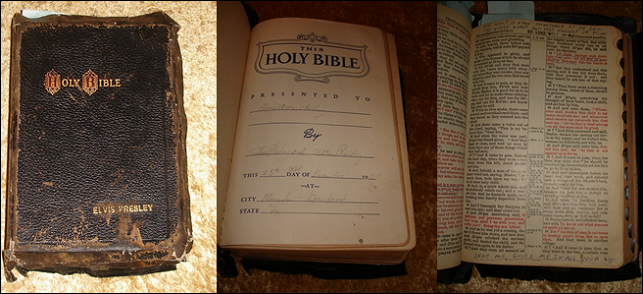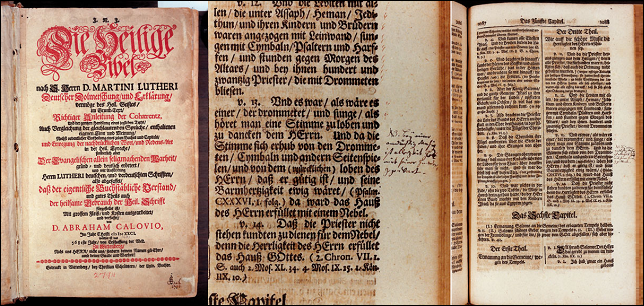Elvis, Bach, and their respective Bibles
[ by Charles Cameron — two books their owners have underlined and scribbled in, a practice I generally detest, and the issue of what music is suitable for worship ]
.
From the Omega Auctions catalogue of the Presley Collection:
Elvis Owned Holy Bible given to him in 1957 on his first Christmas at Graceland (estimate £20,000 – £25,000).
Elvis Presley’s personally owned and used Holy Bible 1957-1977 with Elvis’ handwriting, annotations and underlining throughout. This was Elvis Presley’s most precious book throughout his life from Christmas 1957 to that final day on 16th August 1977 and he read and wrote in this Holy Bible over many years. This sixteen hundred page bible with Elvis Presley and Holy Bible, embossed in gold on a leather cover was given to Elvis by his uncle Vester and Aunt Clettes Presley as a Christmas gift on December 25th, 1957 at Graceland. The bible contains Elvis’ personal annotations throughout its fragile pages. This bible was published by. The John A. Hertel Co., Chicago, IL ©1941.
I’d say that would be a steal at the price!
The auction starts at 3pm GMT on Saturday 8th September 2012 at Meadow Mill, Water St, Stockport, SK1 2BX, UK, but there are viewings on Friday 7th September from 11.00am – 6.00pm and on Saturday 8th September from 8.30am – 10.30am.
**
Tell you what I’d prefer myself, though — and I would’t even want to own it — just to know it’s there in the Concordia Seminary Library:
The 3-volume Bible commentary compiled by 17th-century Lutheran theologian, Abraham Calov, and once in the library of Johann Sebastian Bach has been in the Seminary Library collection since it was given to the Seminary by the Reichle family of Frankenmuth, MI, in the 1930s. The volumes are the only known, i.e., identified, books from the library of J. S. Bach. Calov is both editor and author of the commentary, using as he does both Martin Luther’s translation of the Bible and primarily Luther’s comments on the text, adding his own commentary when no material was available in Luther’s works. The work was printed in 1681-82. Some 25 marginal annotations of Bach, along with underlining and other marginal markings, are evidence of the composer’s use of the volumes. Careful analysis of the handwriting, as well as technical analysis of the ink done in the 1980s, established the authenticity of Bach’s ownership.
**
Is that your final choice?
That is my final choice.
**
Really what I’m getting at, though, is something that those two books can stand for: the debate now proceeding in the Catholic Church — and in Evangelical and Pentecostal Churches too — as to what kind of music is to be performed in the course of worship. The “battle lines” tend to be drawn between music that is intended to draw in the young, and music that is felt to be well-suited to the sacred.
Pope Benedict XVI is a strong proponent of the Western musical tradition:
An authentic updating of sacred music can take place only in the lineage of the great tradition of the past, of Gregorian Chant and Sacred Polyphony.
More personally, Benedict is an admirer of Mozart, whose music he plays daily on the piano — and of JS Bach, about whom he once said:
The encounter with the beautiful can become the wound of the arrow that strikes the heart and in this way opens our eyes, so that later, from this experience, we take the criteria for judgment and can correctly evaluate the arguments.
For me an unforgettable experience was the Bach concert that Leonard Bernstein conducted in Munich after the sudden death of Karl Richter. I was sitting next to the Lutheran Bishop Hanselmann. When the last note of one of the great Thomas-Kantor-Cantatas triumphantly faded away, we looked at each other spontaneously and right then we said: “Anyone who has heard this, knows that the faith is true.”
The music had such an extraordinary force of reality that we realized, no longer by deduction, but by the impact on our hearts, that it could not have originated from nothingness, but could only have come to be through the power of the Truth that became real in the composer’s inspiration.
Blogs like the Chant Cafe and colloquia like those of the Church Music Association of America are introducing a new generation of worshipers to this tradition.
**
Interestingly, though, something of the same sort is also discernible in the writings of the Australian Pentecostal preacher and author named (perhaps coincidentally, maybe by grace) Barry Chant.
Here in the early 21st century, Chant wrote in “Retuning the Church”:
an unhealthy number of new songs focus more on rhythm and harmony than melody … Whereas a half century ago, Christians sang songs in which there were disciplined rhythms and rhymes, and both melody and lyrics followed an obvious orderly pattern, today’s rhythms are more likely to be disruptive and disjointed… ‘feeling’ is what matters. So the pulsating rhythms throb through our beings, the compelling beat makes our bodies respond and the intellectual or biblical content only needs to be sufficient to justify calling what we are singing ‘Christian’
But hey, this discussion goes back a while… Back in the mid fourth century CE, St Basil the Great wrote:
The passions born of illiberality and baseness of spirit are naturally occasioned by this sort of music. But we must pursue that other kind, which is better and leads to the better, and which, as they say, was used by David that author of sacred songs, to soothe the king in his madness. And it is said that Pythagoras, upon encountering some drunken revelers, commanded the aulete who was leading their song to change the mode and to play the Dorian for them. They were so sobered by this music that tearing off their garlands they returned home ashamed. Others dance to the aulos in the manner of the Corybantes and Baccantes. Such is the difference in filling one’s ears with wholesome or wicked tunes! And since the latter type now prevails, you must have less to do with it than any utterly depraved thing.
And yet hey, hey — L’homme armé was a pop song in France around the time of the Renaissance — yet composers from Josquin to Benedict’s beloved Palestrina based settings to the Mass on its tune…
**
The single piece of recorded music that I play most often for myself is Sara Mingardo‘s rendering of the recitative O selger Tag in rehearsal with John Eliot Gardiner, which is mercifully available on DVD.
On that same DVD, just after Mingardo has concluded her luminous performance, Gardiner quotes Bach as saying “Nota Bene: Bey einer andächtigen Musique ist allezeit Gott mit seiner Gnadengegenwart” — and then comments:
Now I find that very, very significant. That he’s saying wherever there is devotional music, God with his grace is present. Which, from a strict theological point of view is probably heresy, heretical, because it’s saying that music has an equivalent potency to the word of God. And I think that in essence is why Bach is so attractive to us today because he is saying that the very act of music-making and of coming together is, in a sense, an act which invokes the latency, the potency, the potentiality of God’s grace, however you like to define God’s grace; but of a benediction that comes even in a dreadful, overheated studio like Abbey Road where far too many microphones and much too much stuff here in the studio itself, but if one, as a musician, puts oneself in the right frame of mind, then God’s grace can actually come and direct and influence the way we perform his music.
Aaaaaaah….





September 9th, 2012 at 10:36 am
The bible which belonged to Elvis Presley has sold for £59,000 ($94,000) on September 8th at at Omega Auctions Stockport, Greater Manchester, – the sale catalog. A pair of the singer’s unwashed underpants failed to sell, according to the BBC report.